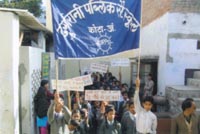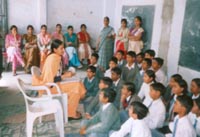| National Green Corps through the Eyes of an Evaluator Usha Srinivasan @ Manuja Dubey usrinivasan@devalt.org The Programme T he Ministry of Environment and Forests (MoEF) initiated the programme in the year 2001 –  2002 in various parts of the India for raising the ‘National Green Corps’, through eco clubs in schools. As a part of this programme, Eco-clubs are being set up in about 100-150 schools of each District of the country. So far, about 47,000 Eco-clubs have been set up across the entire length and breadth of the Nation. The main objectives of this programme are: 2002 in various parts of the India for raising the ‘National Green Corps’, through eco clubs in schools. As a part of this programme, Eco-clubs are being set up in about 100-150 schools of each District of the country. So far, about 47,000 Eco-clubs have been set up across the entire length and breadth of the Nation. The main objectives of this programme are: | 1. | To educate children about their immediate environment; | | 2. | To impart knowledge about the eco-systems, their inter-dependence and their need for survival, through visits and demonstrations; | | 3. | To mobilise youngsters by instilling in them the spirit of scientific inquiry into environmental problems and; | | 4. | To involve them in the efforts of environmental preservation |
It is being implemented in each State/UT through Nodal agency appointed by the State/UT Government, State Steering Committee, State Resource Agency and District Implementation and Monitoring Committee (DIMC)
The Evaluation The present assignment is to conduct the mid term evaluation of the aforesaid programme. Development Alternatives has been assigned to conduct the exercise in the states of Punjab, Rajasthan and Chattisgargh. The evaluation would help the MoEF in identifying the targets reached, and impacts generated against the set objectives of the programme in the two and a half years of its implementation. After a systematic and comprehensive evaluation and identification of the strengths and weaknesses, the resulting valuable suggestions would go a long way to maximise and further enhance the overall impacts of the programme. The study would also help the MoEF to compare the present impacts with the set objectives which would in turn help in identifying & addressing the gaps and adopting the best practices. |  |  | | Rally by an eco-club, Kota, Rajasthan | Group discussion with an eco-club, Kota, Rajasthan | Evaluators Role and Methodology The evaluators visited various states under evaluation, the identified districts and the schools selected for the study for assessing the programme activities, outreach and impact at all levels. While selecting the districts and schools for evaluation, the entire focus was on equivalent socio- economic and demographic coverage. The methodology adopted was: | l | Initial Meetings with the State level agencies i.e. state nodal agency and state resource agency. | | l | District Selection in the states of Punjab, Rajasthan & Chattisgarh based on the information from state nodal agency. | | l | Preparation of Questionnaire for discussion with agencies and persons involved at various stages. | | l | Selection of Schools in each district under evaluation (six numbers) to include government, private, aided, girls, boys, and co-education schools. | | l | Visit to Districts under Evaluation for discussion with (DIMC), School Principal, teacher - in – charge, eco - club member students and with any other teacher of the school. | | l | Evaluation and Report Writing | | l | Suggestions and Recommend-ations for Effective Implementation | Coordination | l | There is a pressing need for a National level agency which coordinates with the State Nodal Agency, Resource Agency and the Ministry of Environment and Forests. This agency would be directly responsible for communication and reporting at all levels of functioning. | | l | The roles and responsibilities of various agencies should be well defined so that they are complementary to each other and do not overlap. | | l | The State nodal agency can be either Bharat Scouts and Guides or the like in all states which already have a strong network of schools, intensive outreach and a foray of activities which can easily incorporate NGC activities. | | l | One person in DIMC cannot look after 150 Eco-clubs in the district. A devoted team should be responsible for programme coordination and implementation at the district level. This would ensure continuous communication with and guidance to the eco -clubs | | l | An annual calendar of activities should be prepared and distributed. | Capacity Building | l | Suitable and permanent master trainers need to be identified and trained by experts | | l | All teachers in charge need to be trained at least once a year. | | l | The training should be for duration of at least 3 days with hands on activities, field trips and feed back sessions. | | l | Training programmes should be designed on the basis of need analysis | | l | Trainings should also be conducted for district and state level coordinators for proper understanding of the programme and its functioning. | Resource Agency/ Material | l | State Resource agency should be a state based NGO. It will be aware of the local issues and will have a strong presence in the state. It can assist the State nodal agency and DIMC in developing/ selecting resource materials, identifying master trainers, and in conducting trainings for teacher in-charge. | | l | The resource material should be in the local language and well distributed amongst all eco –clubs. | | Financial Aspect | | l | Eco clubs need more funds (Rs.5000/- annually) for effective functioning. Besides this efforts should be made by the school and DIMC to harness funds from local corporate, Panchayats and other agencies. | | l | It should be ensured that the allocated funds reach all the member schools and on time in the beginning of the year | | l | Finances should be allocated for providing incentives to Eco club teachers in charge and for awards to students including caps and badges to the eco-club members | Conclusion The concept and outreach of the National Green Corps Programme is well laid out. With the focused objective of bringing about attitudinal change in the masses through children the program began favorably. But in the long run, lack of coordination, feedback mechanism, and monitoring resulted in the objectives being unmet. Lack of interest and enthusiasm for the cause at all levels led to ineffective implementation. Thus a revamping and rejuvenation of the programme requires systemic changes in the functioning. Working in close liason at all levels with non- government organisations having past experiences in managing and implementing such programmes would surely yield desired impacts. q
Back to Contents |
 2002 in various parts of the India for raising the ‘National Green Corps’, through eco clubs in schools. As a part of this programme, Eco-clubs are being set up in about 100-150 schools of each District of the country. So far, about 47,000 Eco-clubs have been set up across the entire length and breadth of the Nation. The main objectives of this programme are:
2002 in various parts of the India for raising the ‘National Green Corps’, through eco clubs in schools. As a part of this programme, Eco-clubs are being set up in about 100-150 schools of each District of the country. So far, about 47,000 Eco-clubs have been set up across the entire length and breadth of the Nation. The main objectives of this programme are: 
